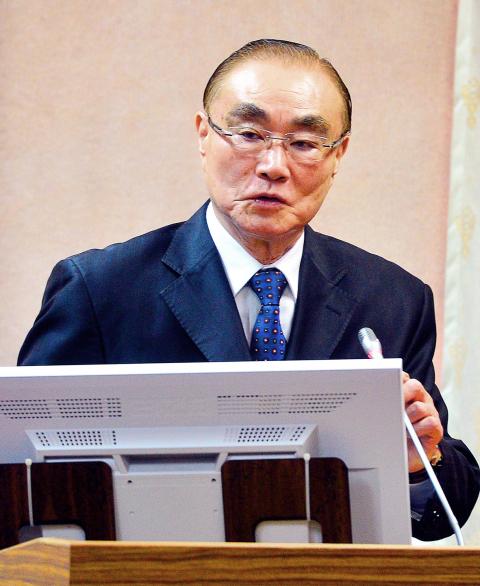The Ministry of National Defense yesterday confirmed for the first time that China has Dong Feng-16 (DF-16) missiles aimed at Taiwan in a bid to increase military pressure on the nation.
In a report delivered to the legislature’s Foreign and National Defense Committee, the ministry said Beijing has stepped up military threats toward Taiwan, pushing for military reforms and advancing its joint forces operations.
“In recent years, China’s navy and air force have introduced new warships, domestically produced fighter jets — including the Chengdu J-10, Shenyang J-11 and Shenyang J-15 — and Russian-made Sukhoi Su-35 multipurpose fighter jets, and put its latest stealth fighter, the J-20, into service,” the ministry said.

Photo: Wang Yi-sung, Taipei Times
The Chinese People’s Liberation Army Rocket Force has deployed DF-16 ballistic missiles, capable of conducting precise strikes on Taiwan proper, it added.
According to military sources, the DF-16 medium-range ballistic missile is guided and can carry multiple warheads, making it much more difficult to intercept.
Minister of National Defense Feng Shih-kuan (馮世寬) said recent events indicate that Beijing is seeking to stir up domestic discontent in Taiwan by increasing its military activities to force Taipei to fall in line with its cross-strait policy.
Feng cited as examples China’s first and only aircraft carrier, the Liaoning, passing through the first island chain in international waters off eastern Taiwan in December last year, as well as retired Chinese military officers’ repeated warnings about the risks of military conflict across the Taiwan Strait.
Responding to a question from Democratic Progressive Party (DPP) Legislator Liu Shih-fang (劉世芳) about Taiwan’s ability to intercept and counter DF-16 missiles, Feng said the Patriot Advanced Capability-3 (PAC-3) missile systems can meet the task.
“As the DF-16 is released at a high altitude and targets a single area, we are able to counter the missile as it passes through the atmosphere,” Feng said.
Lieutenant General Chiang Chen-chung (姜振中), director of the ministry’s Office for Operations and Planning, said the PAC-3 missile system can effectively take down the DF-16 when it is flying between 40km and 70km away, preventing it from hitting Taiwanese soil.
To improve the nation’s integrated air defense capabilities and in response to an increased Chinese military presence in the area, the ministry earlier this month said that it has deployed PAC-3 missile batteries to Hualien and Taitung counties.
Dismissing US President Donald Trump’s reported plans to announce new arms sales to Taiwan after a proposed meeting with Chinese President Xi Jinping (習近平) next month, Feng said the government has yet to talk to Washington about weapons needs.
“Our policy is to consider any kinds of weapons that can truly increase the nation’s defensive capabilities,” Feng said, expressing hope that the US would authorize a large arms sale package soon.
Additional reporting by Lo Tien-bin

GEARING UP: An invasion would be difficult and would strain China’s forces, but it has conducted large-scale training supporting an invasion scenario, the report said China increased its military pressure on Taiwan last year and took other steps in preparation for a potential invasion, an annual report published by the US Department of Defense on Wednesday showed. “Throughout 2023, Beijing continued to erode longstanding norms in and around Taiwan by employing a range of pressure tactics against Taiwan,” the report said, which is titled “Military and Security Developments Involving the People’s Republic of China (PRC) 2024.” The Chinese People’s Liberation Army (PLA) “is preparing for a contingency to unify Taiwan with the PRC by force, if perceived as necessary by Beijing, while simultaneously deterring, delaying or denying

‘LAGGING BEHIND’: The NATO secretary-general called on democratic allies to be ‘clear-eyed’ about Beijing’s military buildup, urging them to boost military spending NATO Secretary-General Mark Rutte mentioning China’s bullying of Taiwan and its ambition to reshape the global order has significance during a time when authoritarian states are continuously increasing their aggression, the Ministry of Foreign Affairs (MOFA) said yesterday. In a speech at the Carnegie Europe think tank in Brussels on Thursday, Rutte said Beijing is bullying Taiwan and would start to “nibble” at Taiwan if Russia benefits from a post-invasion peace deal with Ukraine. He called on democratic allies to boost defense investments and also urged NATO members to increase defense spending in the face of growing military threats from Russia

PEACEFUL RESOLUTION: A statement issued following a meeting between Australia and Britain reiterated support for Taiwan and opposition to change in the Taiwan Strait Canada should support the peaceful resolution of Taiwan’s destiny according to the will of Taiwanese, Canadian lawmakers said in a resolution marking the second anniversary of that nation’s Indo-Pacific strategy on Monday. The Canadian House of Commons committee on Canada-Chinese relations made the comment as part of 34 recommendations for the new edition of the strategy, adding that Ottawa should back Taiwan’s meaningful participation in international organizations. Canada’s Indo-Pacific Strategy, first published in October 2022, emphasized that the region’s security, trade, human rights, democracy and environmental protection would play a crucial role in shaping Canada’s future. The strategy called for Canada to deepen

TECH CONFERENCE: Input from industry and academic experts can contribute to future policymaking across government agencies, President William Lai said Multifunctional service robots could be the next new area in which Taiwan could play a significant role, given its strengths in chip manufacturing and software design, Taiwan Semiconductor Manufacturing Co (TSMC, 台積電) chairman and chief executive C.C. Wei (魏哲家) said yesterday. “In the past two months, our customers shared a lot of their future plans with me. Artificial intelligence [AI] and AI applications were the most talked about subjects in our conversation,” Wei said in a speech at the National Science and Technology Conference in Taipei. TSMC, the world’s biggest contract chipmaker, counts Nvidia Corp, Advanced Micro Devices Inc, Apple Inc and